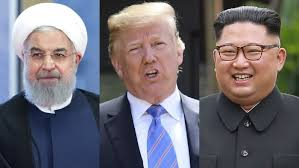
Table of Contents
Introduction
In a recent statement, former President Donald Trump made headlines by asserting that North Korea and Russia are “at the top of their game” while also declaring that he would not “do anything bad to Iran” if he were to return to office. These comments reflect Trump’s distinctive approach to foreign policy and provide insights into his perspectives on international relations. This analysis will explore the implications of Trump’s statements, the context behind them, and their potential impact on global geopolitics.
Context of Trump’s Remarks
- North Korea and Russia at the “Top of Their Game” characterization of North Korea and Russia as being “at the top of their game” suggests a recognition of their significant geopolitical influence and military capabilities. This statement can be unpacked in several ways:
- North Korea’s Military Advances: Under Kim Jong-un’s leadership, North Korea has continued to develop its missile and nuclear capabilities. Despite international sanctions and diplomatic efforts, the regime has demonstrated its ability to enhance its military technology, including advancing its nuclear arsenal and long-range missile capabilities. Trump’s comment could be seen as an acknowledgment of North Korea’s growing strategic leverage and its capacity to influence regional security dynamics.
- Russia’s Geopolitical Maneuvering: Russia, under Vladimir Putin, has been active in various geopolitical arenas, including its assertive military actions in Ukraine and its influence in Syria. Russia’s military modernization efforts and its involvement in global conflicts reflect its ambition to reassert its status as a major global power. Trump’s statement might recognize Russia’s ongoing efforts to strengthen its global position and expand its influence.
- No “Bad” Actions Toward Iran Trump’s declaration that he would not “do anything bad to Iran” suggests a departure from the more confrontational stance he previously took during his presidency. This statement can be interpreted in several ways:
- Diplomatic Flexibility: Trump’s statement may indicate a potential shift towards a more diplomatic or pragmatic approach regarding Iran. During his presidency, Trump adopted a hardline stance against Iran, including withdrawing from the Iran nuclear deal (JCPOA) and implementing stringent sanctions. This comment might signal a willingness to explore new diplomatic avenues or a reduction in aggressive rhetoric towards Iran.
Implications of Trump’s Statements
- Impact on U.S. Foreign Policy Trump’s remarks have significant implications for U.S. foreign policy:
- North Korea and Russia: Recognizing these countries as “at the top of their game” could imply a potential recalibration of U.S. strategies toward these nations. It may suggest that Trump acknowledges their growing influence and might advocate for policies that address their strategic advancements more directly. This could involve reassessing diplomatic approaches, strengthening defense postures, or seeking new agreements to manage relations.
- Iran: assurance of not taking negative actions towards Iran could alter the U.S.’s approach to the Middle East. It might pave the way for renewed negotiations or a shift in policy focus from confrontation to engagement. This change could impact ongoing discussions regarding Iran’s nuclear program, regional influence, and economic sanctions.
- Geopolitical Reactions statements are likely to provoke reactions from both allies and adversaries:
- Allied Responses: U.S. allies, particularly those concerned about North Korea and Russia’s activities, might scrutinize Trump’s comments for potential shifts in U.S. policy. Allies in Europe, Asia, and the Middle East will be keenly watching how these statements translate into actual policy changes and how they affect international cooperation on security and diplomatic issues.
- Adversarial Responses: North Korea and Russia might interpret Trump’s comments as a form of validation or recognition of their strategic positioning. This could influence their diplomatic and military strategies, potentially leading to more assertive actions or attempts to leverage the U.S. stance for their advantage. Conversely, Iran might view the statement as an opportunity for diplomatic engagement or as a sign of a potential reduction in pressure.
- Domestic Political Repercussions Domestically, Trump’s statements could impact his political standing:
- Supporters: His base may view the comments as a pragmatic acknowledgment of global realities, reinforcing their support for his foreign policy approach. Trump’s statements might resonate with voters who favor a more restrained or strategic approach to international relations.
Analyzing the Strategic Context
To fully understand remarks, it is essential to consider the broader strategic context:
- North Korea and Russia’s Current Status
- North Korea: The regime’s continued military developments and its impact on regional security dynamics necessitate a nuanced U.S. strategy. While Trump’s acknowledgment of North Korea’s capabilities might reflect an understanding of its strategic posture, it also raises questions about the effectiveness of past policies and future approaches.
- Russia: Russia’s assertiveness on the global stage requires careful management of U.S.-Russia relations. Trump’s recognition of Russia’s status may suggest an awareness of its global influence, but it also highlights the need for effective strategies to address challenges posed by Russian activities.
- Iran’s Regional Influence
- Middle East Dynamics: Iran’s role in regional conflicts and its nuclear ambitions are critical issues. Trump’s statement on Iran suggests a potential shift towards engagement, which could affect ongoing diplomatic efforts and regional stability. Balancing these considerations will be crucial for any future U.S. administration.
Conclusion
Donald Trump’s recent comments on North Korea, Russia, and Iran reflect his characteristic approach to foreign policy, characterized by direct and sometimes unconventional statements. By acknowledging North Korea and Russia as being “at the top of their game” and signaling a less confrontational stance towards Iran, Trump has set the stage for potential shifts in U.S. foreign policy.
These statements have significant implications for international relations, U.S. domestic politics, and the strategies of both allies and adversaries. As the global landscape continues to evolve, Trump’s remarks underscore the complexities of managing relations with major global powers and navigating the challenges of international diplomacy. The impact of these statements will depend on how they translate into policy actions and how they are received by the international community and U.S. voters.







